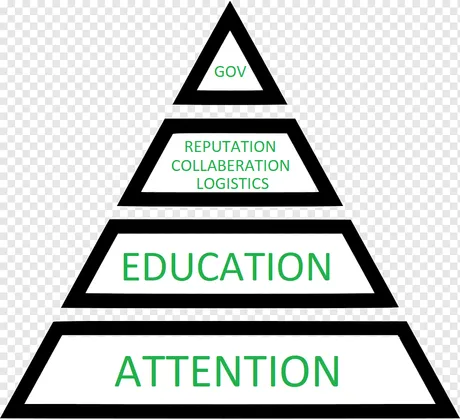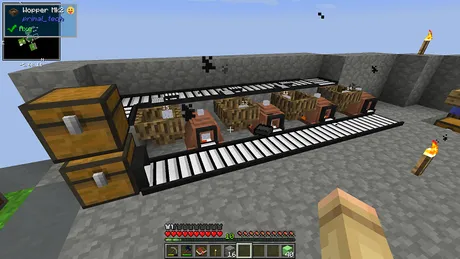
Yesterday I was going to write about huge scaled-up decentralized communities and organizations that would inevitably replace corporations as we know them today. However, after the second paragraph it devolved into Globalist Depopulation conspiracy theory and I just rolled with it. There was no way to return to the real topic at hand within that post.
Aftermath
To be clear about my last post, there's still a decent chance that there isn't a worldwide murder agenda going down, and that the reason all these institutions are lying is simply pure capitalistic greed. Why are children getting the vaccine even though the illness doesn't threaten them? Money. Why are all the other remedies being suppressed? Money. Why are all the statistics being manipulated in favor of alarmism? Money. Why do they want everyone to get more booster shots? Money. Why are small businesses being shut down? Money. Why vaccine passports? Money and control and data.
ETC ETC ETC

Greed wins
In fact I would be quite surprised if the vaccines were purposefully created to purge the population for this exact reason. The first rule of capitalism is simple: money wins. When genocide is concerned: you're only allowed to kill poor people. If you try to kill people with resources, they are going to fight back, and you might lose. Most players have learned that they should only pick fights that they have a 100% chance of winning. This is the most profitable way to win the war of imperialism.
It stands to reason that even if the vaccine is dangerous, rich people will still be able to pay their way out of this danger just like they always do. It's always the poor people that get decimated. Remember that: these are the rules, and the symbolism appears everywhere; especially on money itself.

But that's not what this post is about... damn it!
Trying not to get sucked back into this GD topic again...
I have visions about the decentralized future, and I see some very crazy stuff. The open source training ground is real, and the foundation of this training ground is the gamification of education.

It becomes obvious to me that the dinosauric legacy economy can not follow us into the metaverse. We have access to limitless money and can program new tools on a daily basis, while they will be stuck in the Stone Age forever. We can get people's attention with airdrops.
I'll say that again for emphasis: we can give away massive amounts of free money in exchange for a little bit of attention. The old system would be bankrupted immediately if they attempted such a feat. In fact, they do things in the exact opposite way: acquire the attention in another way and make a tiny bit of advertising money based off of the attention they've been able to farm with 'free' Web 2.0 services. It's totally backwards from WEB3.
Whereas in the legacy economy one must go into crippling debt to get a bullshit pieces of paper that says they know something (diploma), in the metaverse economy we can not only airdrop new members just to pay attention to us, we can pay them even more to learn the ropes so that they can better bring value into these new universes.

The base of the pyramid is attention.
If we can't get anyone's attention, then we don't have a community. Every community needs a ground floor for new users to jump in. The UX (user experience) on this level is of the utmost importance. Systems that are too complex (such as Hive without Lite Accounts) are not good enough to get mainstream adoption.
People need a reason to pay attention to these networks, be it airdrops, jobs, speculation, supplemental/passive income, gaming, art, information, or whatever else. Successful networks will have all of these things and more.
The second layer of the pyramid is education.
Once you have their attention, you have to teach them how they can build value for the platform, and pay them for it. On protocols like Ethereum pretty much only devs can build value. On Hive we have prototyped blogging as a job but it is extremely subjective and networking based gladhanding (which is fine for now). Hive is still extremely ahead of the curve in this regard.
The top of the pyramid is governance.
Who's in charge? On DPOS, it's those crazy rich ass whales calling the shots. However, as our distribution improves there will be major upsets of governance on Hive and other DPOS networks. The rabble has a voice. Those 500 HP votes can add up big time when proper consensus is achieved. Of course by that time 500 HP (minnow) might be worth $50k so who knows how it will all turn out.
It is even somewhat of a mistake to portray this type of flat architecture as a pyramid in the first place. This is simply the imperialist shape that most people have known for their entire lives. People understand the pyramid and the chain of command.
The problem is that this "chain of command" is not a chain at all. The higher level doesn't control the lower levels. Anyone can fork the protocol at any time or create a token outside the rule of traditional governance, so things get complicated very quickly with clustered decentralized systems.

My ultimate focus is gaming:
Therefore I see all of these layers through a completely different lens than other citizens of the metaverse. Which brings me to my main point... the one I've been trying to get to since yesterday when I went off, on the genocide tangent.

Minecraft and Factorio are Timeless Classics
I've never liked Minecraft until now. I just started playing, even though many people have tried to get me to play in the past; this game has been around since 2011 and remains surprisingly popular.
I also believed Factorio was a fad, but just like Minecraft, it appears to be timeless and just keeps gaining more popularity. I think I've realized the reason why.
Sandbox games.
Sandboxes are a genre of game that I have never liked until now.
I like having an objective.
- Real Time Strategy: Kill or be killed.
- Turn based strategy: dominate with superior moves.
- Luck based strategy (poker): win on average.
- MMO/RPG: grind grind grind, hack and slash. Digital lottery.
- Autochess and deckbuilding: choose the best path possible.
- MOBA: work together to kill the enemy base.
- Boardgames: win.
Meanwhile, in a sandbox, there largely is no objective unless you boot up a mod that gives you one. I never liked that, but I'm coming around. It opens up the ability to be creative, but more importantly it mirrors the foundations of computer science itself.

In factorio, when you zoom out it looks like you're creating a motherboard of circuits; very cool and crazy game. The things you can do in it are somewhat mindboggling. It's very technically-minded, which is why, along with Minecraft, these sandbox games are the perfect training camp for developers within the metaverse.
The ultimate crypto business models will flow like this:
- Why did you join Hive?
- To get paid while playing a video game.
- What did you learn?
- Basic principals of programming and logistics.
- How to creatively solve problems.
- Critical thinking skills
Crypto lowers the bar for everything.
What does it take to be a professional gamer these days? You have to be the best. You have to win tournaments on top of getting sponsored. You must sell your soul in exchange for those advertising dollars.
When gamers realize that pretty much anyone (top 50%) can be a professional gamer (normally top 0.001%), it's going to change the entire world. We can simply print the money and give it to people, because on average that money printed brings more value to the network than the inflation dilutes. It's a self-funding system; all of crypto is.
Workflow:
- Play game for money.
- Develop the game for more money.
- (NFT art/graphics, upgrades/collaboration/brainstorming, etc)
- Learn real programming languages
- Emphasis on Javascript and Python.
- Become a freelance developer (hopefully on Hive).

I can see these things clear as day in my mind.
We will be able to scoop up and teach so many people skills that they would have never been able to learn otherwise (because they could not afford it). Even free service is not enough. Users must be PAID to learn. And once they do they will become addicted and never look back to the bullshit legacy economy from which they came. Game on.
I've even brainstormed my own game
One that would directly teach Javascript/Python commands as part of the game itself. But seeing as that all I have are ideas and no actual company to bring them to life (yet) this one remains on the extreme backburners.
Conclusion
In a world of increasing automation, it has never been more important to create high paying jobs that have life-long staying power. Citizens of the metaverse will be taken care of by their respective communities, and the WEB 2.5 abomination that corporations try to zombify to life will be an abysmal failure. The future belongs to communities that control their own currency and train their own employees in a decentralized free-lance opt-in system where everyone is their own boss.
I can see it clearly.
Why can't they see it? #buidlit
Posted Using LeoFinance Beta
Return from Open Source Training Ground to edicted's Web3 Blog
